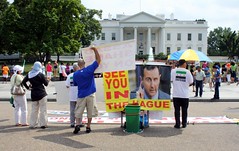Nigerian activists with Nigerian LGBTQI in Diaspora, friends and allies, and campaigners with AllOut.org rallied outside of the Nigerian Mission to the United Nations 5 December and delivered a petition with 60,000 signatures.
The Nigerian Senate has passed a bill that would make it a punishable offense—of up to 14-years in prison—for anybody to go to a gay bar, to work for or be involved with LGBT organizations, or to be in an openly gay relationship.
Anyone who doesn't report men or women living together - a 'gay marriage' in this bill - would also be punished. The bill (see copy below) appears to punish anyone supporting LGBT human rights, or even writing about gay people.
After passage through the Senate the bill goes through the House of Representatives before requiring the President's signature.
“Instead of passing anti-gay laws, Nigeria needs to focus on repealing its sodomy laws, laws that were originally imposed by British colonialism."The Consul-General of Nigeria to the UN, Mr Habib Habu, told the News Agency of Nigeria (NAN) that was told that the protesters came around and left after a while without demanding to present their grievances to anyone.
"I learnt it's like people making a brief stop-over for a while. If they had requested for me, I would have received them," he said.The bill has been publicly criticised by the businessman Richard Branson.
“All of us with influence in Nigeria must do what we can to stop this cruel law. I would urge educated Nigerians all over the world to do what they can to help fight this discrimination,” he wrote.The small protests, as well as the large petition, have generated substantial media coverage in Nigeria.
As well, BBC News carried this video interview with Queer Alliance activist Rashidi Williams, who was one of the activists shouted down at the Nigerian Senate hearing last month.
An ongoing theme of the reports as well as comments in social media is the impact if the bill becomes law in generating refugees.
Speaking to This Day Live, bisexual Nigerian diaspora activist Yemisi Ilesanmi said:
"Criminalising same sex relationships makes us refugees; it turns us into asylum seekers in other countries. This also affects our beloved country as emigration causes brain drain."
"Many talented Nigerians are living in Diaspora openly as gays, lesbians, bisexuals, and transsexuals. We contribute positively to the development of our country of residence but we are afraid to come live and contribute to the development of our motherland because of fear of victimisation. We visit home with trepidation because at home we have to live a life full of lies and deny who we are for us to be accepted. Why do we want to keep subjecting our citizens to such psychological and emotional torture?"
"Some Nigerian Lesbians, Gays, Bisexuals, Transsexuals and Intersex living in Diaspora are married to same sex partners or planning to do so. Section 1(3) of this bill states that a valid same sex marriage entered into abroad would not be valid in Nigeria. This is unfair."
"We as Nigerian LGBTIs living in Diaspora do not want to be isolated from our family members and childhood friends. Many of us grew up in Nigeria and are happy to call Nigeria our motherland. However, because of the misconception surrounding our sexual orientation, and the criminalisation of thereof, we are estranged from our loved ones. Families have been broken, friendship links cut off and hate fostered - all because of ignorance and misunderstanding."
"Many Africans became intolerant of homosexuality and transsexuals only after foreign religions were imposed on them. In many African cultures, homosexuals and transsexuals were revered and worshipped as spirits of the gods. Sango, the god of thunder was often described as a beautiful man who dressed and accessorised and had his hair braided like a woman. Sango priests, all men, dress in women apparels when performing traditional rituals. Now tell me that is un-African!"
"I am Proudly African and I am mystified whenever I am accused of "promoting and defending European sexual perversity" (whatever that means). In fact from various historical paintings on Ancient Africans walls, our ancestors enjoyed homosexual sex, affection and love and that was one reason Christian missionary colonisers immediately imported their sodomy laws into our constitutions; they imported homophobia because they thought our free loving ancestors were barbarians!"
"Many claim Homosexuality is Alien to Africa. I am an African, I am bisexual, I was bisexual before I ever met any white person or stepped foot on European shore, so does that mean I am a fake African?"




































 Join our page
Join our page

